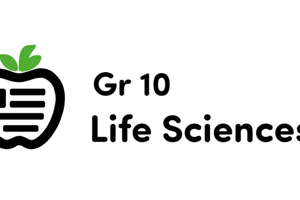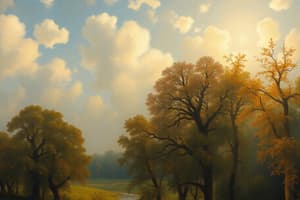Podcast
Questions and Answers
What is the carbon cycle?
What is the carbon cycle?
- Organisms that break down dead remains
- The processes by which oxygen and carbon are linked and are naturally recycled (correct)
- The layer of gases around the planet
- The process of burning fuels
What is carbon dioxide?
What is carbon dioxide?
A gas that is expelled from the body by the respiratory system and produced during combustion.
Who are considered producers?
Who are considered producers?
Plants and algae that make their own food from the sun's energy.
What are consumers?
What are consumers?
What is photosynthesis?
What is photosynthesis?
What are decomposers?
What are decomposers?
What is the atmosphere?
What is the atmosphere?
What are fossil fuels?
What are fossil fuels?
What are greenhouse gases?
What are greenhouse gases?
What is combustion?
What is combustion?
What is respiration?
What is respiration?
What is carbon?
What is carbon?
What is glucose?
What is glucose?
What is a herbivore?
What is a herbivore?
What is a carnivore?
What is a carnivore?
What is a detritivore?
What is a detritivore?
Study Notes
The Carbon and Oxygen Cycle
- The carbon cycle describes the natural processes linking carbon and oxygen, facilitating their recycling in the environment.
- Carbon dioxide is a gas produced during respiration and combustion, crucial for the life cycle of plants and animals.
Producers
- Producers include plants and algae, which use sunlight to create their own food through the process of photosynthesis.
- Photosynthesis transforms sunlight, carbon dioxide, and water into glucose, a vital energy source for living organisms.
Consumers
- Consumers are organisms that derive their energy by feeding on other organisms rather than producing their own food.
- Herbivores exclusively consume plants, while carnivores feed on other animals.
Decomposers and Detritivores
- Decomposers, like fungi and bacteria, break down dead organic matter, returning carbon to the soil and contributing to nutrient cycling.
- Detritivores consume decomposing plant and animal remains, playing a key role in the degradation process.
Greenhouse Gases and Climate Impact
- Greenhouse gases, such as carbon dioxide and methane, trap heat in the Earth's atmosphere, contributing to global warming.
- Combustion processes release significant amounts of carbon dioxide into the atmosphere, impacting climate change.
Additional Key Terms
- The atmosphere is comprised of a layer of gases surrounding the Earth, essential for life and climatic regulation.
- Fossil fuels, including coal, gas, and oil, are derived from ancient carbon deposits, formed under pressure over millions of years.
- Respiration is the cellular process using oxygen to convert food molecules into energy, releasing carbon dioxide as a byproduct.
Important Biochemical Compounds
- Glucose is a simple sugar produced by photosynthesis, serving as a crucial energy source for organisms.
- Carbon is a fundamental element found in all living organisms, essential for the structure and function of biological molecules.
Studying That Suits You
Use AI to generate personalized quizzes and flashcards to suit your learning preferences.
Description
This quiz features essential terms and definitions related to the carbon and oxygen cycles. Explore key concepts such as carbon dioxide, producers, and consumers, enhancing your understanding of these vital natural processes. Perfect for students studying ecology and environmental science.





